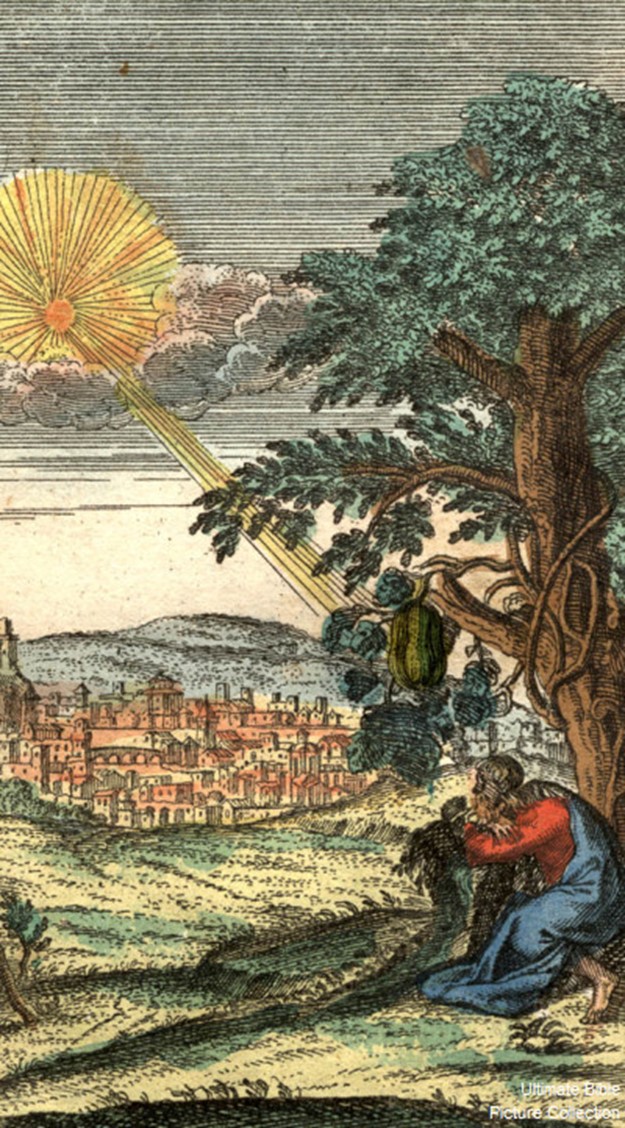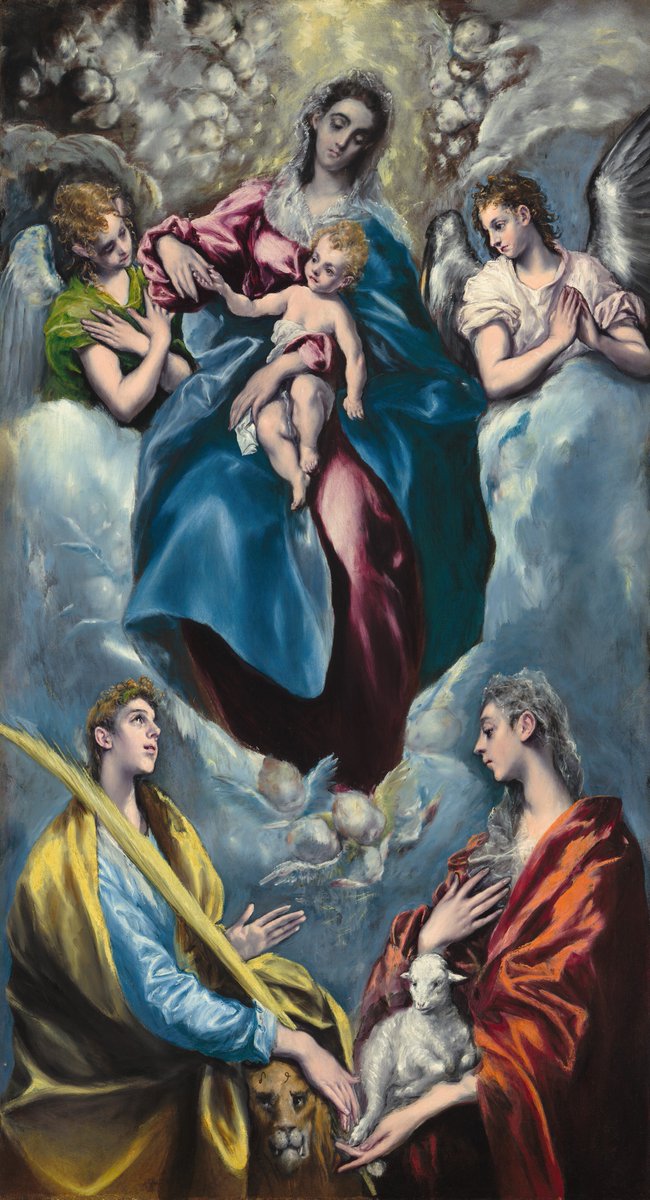
The Lord didn't tell Jonah He would relent ("repent") if Nineveh repented, but only to announce their overthrow bc of their wickedness.
But when Jonah preached to Nineveh, the king decreed that all should repent and mourn, saying, 'Who knows, maybe God will relent!' And God did.
But when Jonah preached to Nineveh, the king decreed that all should repent and mourn, saying, 'Who knows, maybe God will relent!' And God did.

And Jonah was angry w God and wanted to die, bc God spared the decadent, oppressive Gentile nation.
God said nothing of the possibility repentance might change the outcome; He showed it thru His (reluctant) prophet,
Jonah, who knows something of the Name and inner life of God:
God said nothing of the possibility repentance might change the outcome; He showed it thru His (reluctant) prophet,
Jonah, who knows something of the Name and inner life of God:
"This is why I fled at first to Tarshish. I knew that you are a gracious and merciful God, slow to anger, abounding in kindness, repenting of punishment. So now Lord, please take my life from me; it is better for me to die than to live."
(Jonah is quoting God's words: Ex 34:6f)
(Jonah is quoting God's words: Ex 34:6f)
But the Lord asked, “Are you right to be angry?”
and again,
"Should I not be concerned over the great city of Nineveh, in which there are more than a hundred and twenty thousand persons who cannot know their right hand from their left, not to mention all the animals?”
and again,
"Should I not be concerned over the great city of Nineveh, in which there are more than a hundred and twenty thousand persons who cannot know their right hand from their left, not to mention all the animals?”
No man was closer to God than Moses.
After that second great rebellion in the exodus wanderings (Numbers 13-14), the Lord said He would destroy the Israelites in the desert and begin the nation of Israel again with Moses. He says He will do it, the unchanging God of the Torah.
After that second great rebellion in the exodus wanderings (Numbers 13-14), the Lord said He would destroy the Israelites in the desert and begin the nation of Israel again with Moses. He says He will do it, the unchanging God of the Torah.
For the Jewish Scriptures, obeying the Lord is by definition the right thing to do, always. He never changes; but there's a mystery about intimacy with God,
Bc Moses loves the Lord /and/ his fellow Israelites; he knows what the Lord is truly like, bc he shares in His inner life.
Bc Moses loves the Lord /and/ his fellow Israelites; he knows what the Lord is truly like, bc he shares in His inner life.
Moses does not accept what God said He would do. He intercedes, repeating to the Lord His own words:
"Now then, may my Lord’s forbearance be great, even as you have said:
'The Lord is slow to anger and abounding in kindness, forgiving iniquity and rebellion;
"Now then, may my Lord’s forbearance be great, even as you have said:
'The Lord is slow to anger and abounding in kindness, forgiving iniquity and rebellion;
"yet certainly not declaring the guilty guiltless, but punishing children to the third and fourth generation for their parents' iniquity.'
Pardon, then, the iniquity of this people in keeping with your great kindness, even as you have forgiven them from Egypt until now.
Pardon, then, the iniquity of this people in keeping with your great kindness, even as you have forgiven them from Egypt until now.
"The Lord answered: I pardon them as you have asked."
God drew Moses into His own inner life so he could speak that way.
We are not more merciful than Him; it is only His mercy which inspires such exchanges between Him and His creatures as when Moses interceded for his people.
God drew Moses into His own inner life so he could speak that way.
We are not more merciful than Him; it is only His mercy which inspires such exchanges between Him and His creatures as when Moses interceded for his people.
Our salvation is bound up together. We depend on God - He /is/ our salvation - yet our own free participation (that is, spiritual adulthood) remains essential - because salvation is life in God, and life in God is participation in His inner life.
If we're secure in conceiving of the divine nature as immutable and impassable, we should be just as secure from continual forgetfulness of Prophets like Hoshea and Jeremiah, who show the inner life of God, whose people have left Him, as an inconsolable, rejected husband;
These philosophical truths of the unchanging God can protect from anthropomorphism, as though His will was arbitrary or His knowledge limited; and the testimony of the prophets protects us from forgetting that God isn't an indifferent abstraction or impersonal principle;
Not as if the prophets didn't know the former - nor were they bound by it. Creaturely emotions reflect the Creator somehow. The prophets weren't content to call Him only King, Savior, Teacher, but also Father. Isaiah's "Servant of the Lord". He comes as a Child, Brother, Friend.
St. Paul says things of Him the Prophets did not say.
"The firstborn of every creature."
"He took the form of a slave."
Can we dare, like Moses, repeat His own words?
"For the Son of Man did not come to be served but to serve and to give his life as a ransom for many."
"The firstborn of every creature."
"He took the form of a slave."
Can we dare, like Moses, repeat His own words?
"For the Son of Man did not come to be served but to serve and to give his life as a ransom for many."
But He commands us to remember Him so, so that we do the same:
"Whoever wishes to be first among you will be the slave of all."
"If I, therefore, the Master and Teacher, have washed your feet, you ought to wash one another’s feet."
"Whoever wishes to be first among you will be the slave of all."
"If I, therefore, the Master and Teacher, have washed your feet, you ought to wash one another’s feet."
If "My thoughts are not your thoughts / nor your ways My ways," He makes thoughts and ways His ours.
"I no longer call you slaves, because a slave does not know what his master is doing. I have called you friends, because I have told you everything I have heard from My Father."
"I no longer call you slaves, because a slave does not know what his master is doing. I have called you friends, because I have told you everything I have heard from My Father."
"My son, you are here with me always; everything I have is yours."
The Parable of the Prodigal Son ends like this; notice the language and think of Jonah and what I said leading up to this:
The Parable of the Prodigal Son ends like this; notice the language and think of Jonah and what I said leading up to this:
"Now the older son had been out in the field and, on his way back, as he neared the house, he heard the sound of music and dancing.
He called one of the servants and asked what this might mean.
He called one of the servants and asked what this might mean.
"The servant said to him, 'Your brother has returned and your father has slaughtered the fattened calf because he has him back safe and sound.'
He became angry, and when he refused to enter the house, his father came out and pleaded with him.
He became angry, and when he refused to enter the house, his father came out and pleaded with him.
"He said to his father, 'All these years I served you and not once did I disobey your orders; yet you never gave me even a young goat to feast on with my friends.
But when your son returns who swallowed up your property with prostitutes, for him you slaughter the fattened calf.'
But when your son returns who swallowed up your property with prostitutes, for him you slaughter the fattened calf.'
He said to him, 'My son, you are here with me always; everything I have is yours.
But now we must celebrate and rejoice, because your brother was dead and has come to life again; he was lost and has been found.'"
But now we must celebrate and rejoice, because your brother was dead and has come to life again; he was lost and has been found.'"
The love of Jesus' "New Commandment" is by definition uncoerced.
Fear of punishment is the opposite of Christian motive.
Love is never private yet is motivated by nothing external.
Love of God and neighbor are not separate.
Love makes His ways our ways, His thoughts our thoughts.
Fear of punishment is the opposite of Christian motive.
Love is never private yet is motivated by nothing external.
Love of God and neighbor are not separate.
Love makes His ways our ways, His thoughts our thoughts.
St. John says,
"In this is love brought to perfection among us, that we have confidence on the day of judgment because as he is, so are we in this world.
There is no fear in love, but perfect love drives out fear because fear has to do with punishment.
"In this is love brought to perfection among us, that we have confidence on the day of judgment because as he is, so are we in this world.
There is no fear in love, but perfect love drives out fear because fear has to do with punishment.
"One who fears is not yet perfect in love.
We love because he first loved us.
If anyone says, 'I love God' but hates his brother, he is a liar; for whoever does not love a brother whom he has seen cannot love God whom he has not seen.
We love because he first loved us.
If anyone says, 'I love God' but hates his brother, he is a liar; for whoever does not love a brother whom he has seen cannot love God whom he has not seen.
"This is the commandment we have from him: whoever loves God must also love his brother."
And St. Paul again says,
"For you were called for freedom, brothers. But do not use this freedom as an opportunity for the flesh; rather, serve one another through love."
And St. Paul again says,
"For you were called for freedom, brothers. But do not use this freedom as an opportunity for the flesh; rather, serve one another through love."
Religion is not a private matter, and what I do matters, yet, when it comes to love ("the Law of Christ"), nothing and no one external can possibly hold me accountable, but only God and me, and Him more than me; that is the maturity of Christian freedom.
Perhaps when I fail to love, God provides another law, provides accountability - but this is not my calling as a Christian.
"If we live in the Spirit, let us also follow the Spirit." We can only find so much external validation for that,
"If we live in the Spirit, let us also follow the Spirit." We can only find so much external validation for that,
"But the hour is coming, and is now here, when true worshipers will worship the Father in Spirit and truth; and indeed the Father seeks such people to worship him."
@threadreaderapp unroll
• • •
Missing some Tweet in this thread? You can try to
force a refresh





